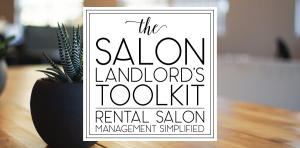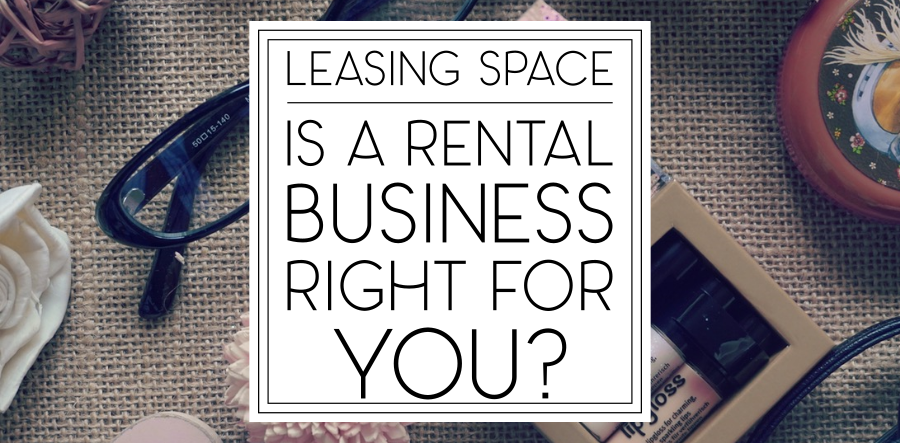Before you consider leasing space to a booth renter (or opening a rental salon), I want you to answer these questions and seriously evaluate whether or not this is the right choice for your business.
Realize first and foremost that being an owner of a booth rental salon makes you a landlord; not a salon owner.
Do you own a business classified as a salon? Yes. But your role isn’t that of a salon owner and your business isn’t one that facilitates the delivery of professional services to consumers. Your role is that of a landlord and your business is providing work space to microsalon owners. Their salons do not belong to you–the building their mini-salons are located in belongs to you.
Think of it like a mall. The mall owns the building that the individual stores are located in, but does not own each individual store, nor can it dictate to those stores how to run their businesses.
- You cannot set policies.
- You cannot set schedules.
- You cannot require “meetings,” or “training,” answer phones or collect money at a central reception desk, or have your renters adhere to an “employee handbook” or any similar, restricting covenants.
Renters sign a lease, pay you their rent, and that’s where your relationship with them ends .
Knowing that, if you are still considering moving forward with booth renters, answer these questions:
1.) Do you care about the quality (or lack thereof) of the services your renters perform?
You cannot control the quality of work at all in a booth rental salon. If clients aren’t happy, you cannot “fire” a renter. You can’t interfere at all with their business.
If you’re a control freak (or have any desire to develop a brand), stop now. Renters aren’t right for you.
If you choose to continue, it’s wise to distinguish your business as a rental business and highlight the independent nature of the salon professionals who work within it. A lot of clients aren’t aware of and don’t understand the booth rental business model. Most believe all professionals are employees of the salon. You may one day have to explain to an irate client demanding reimbursement that you cannot offer refunds since the stylists are all independent and operate as their own businesses. Be prepared for that.
If the renter botches a service, the salon itself is likely to get the bad reviews–not the individual stylist.
This could be a huge problem if your salon has employees and renters (but that setup in and of itself is completely insane–why would you house direct competitors under your own roof?).
2.) Can you handle the fact that there may be times the salon will not be staffed at all?
The renters make their own schedules. There may be a time the salon is not staffed at all. You have to be comfortable with the fact that clients may show up during those times. Unless you plan to hire someone to facilitate reception, it’s a virtual inevitability.
Remember, your business has nothing to do with the clients. The tenants are your customers.
How the tenants manage their schedules, handle their relationships with their clients, and address any complaints those clients may make isn’t your concern.
3.) Are you willing to hire a lawyer to write up your leases properly?
This is a must. Do not try to write your own lease. Have a lawyer write it up and explain to you everything you need to know about being a landlord.
4.) Are you incredibly familiar with your state’s commercial landlord-tenant laws and both state and federal employment laws?
Again, arrange to meet with an attorney regarding this. The money you pay out for professional information is absolutely worth it. Do not try to educate yourself online.
Laws change frequently and there are a lot of intricacies you need to be very aware of.
Do you know what “self-employed” actually means? Do you know how the IRS makes that determination? Do you know why it’s extremely inadvisable to take a percentage of your renters’ sales as rent instead of a flat weekly or monthly rate?
If you don’t know these things and you aren’t willing to pay to have someone inform you, stop now. You aren’t ready for business ownership of any kind.
5.) Do you understand what your rights are, including what you can and cannot legally do regarding evictions?
In addition to speaking with an attorney initially, plan to speak with them regularly before you take any action against a renter.
Always have savings set aside for legal advice when needed. Prior to any eviction, plan on a phone call or meeting with your attorney.
Do not just lock out a tenant for nonpayment of rent. Do not seize or sell belongings without following the proper procedures. Doing so puts you at risk of being sued by the tenant. Eviction isn’t as simple as telling a renter to grab their stuff and get the hell out. Some states have very specific procedures that have to be followed precisely. Find out what this procedure is.
If you are going to pursue the rental business model, do it right.
The Salon Landlord’s Toolkit
Are you renting space to beauty professionals? If so, this toolkit is for you. T he Salon Landlord’s Toolkit includes:
he Salon Landlord’s Toolkit includes:
- Rental Salon Ownership 101: A 22-page comprehensive guide to rental salon ownership
that breaks down everything you need to know in language you can understand. - The Rent Calculator: A spreadsheet system that will automatically calculate your rental rates for you.
- The Rent Calculator Guide: A 6-page instruction manual that will walk you through the spreadsheet in simple steps so you understand what your numbers mean.
- The Rental Salon Owner’s Lease Component Checklist: What makes a perfect lease that’s appealing to tenants, protects landlords, and fair to both parties? This checklist covers the terms and covenants every great lease should contain.
- The Sample Lease Agreement: Against my better judgement, I have included a sample lease agreement. This lease is not meant to be used as a template, but to illustrate what a formal lease agreement looks like. Feel free to use this tool when drafting your lease terms, but never, EVER use it in your own business until a qualified attorney has reviewed and approved it.
Get a Salon Landord’s Toolkit today by clicking here!
$14.99Add to cart









One Response
The only time that I fired a booth renter was when she was selling my hair care products and accidentally keeping a receipt and 100% of the sales. It was after I asked her to meet for coffee to discuss our little situation. After she told me that she didn’t want to see my face. I asked her to go ahead and pack up. She refused. I called law enforcement. Oh, she had stolen some of my equipment (to take it home and wash/without out my permission). She had also given her son a key to the business after signing an agreement that the key was to be used only by the booth renter. She needed to be the boss/owner. As far as I know, she didn’t pay taxes on the products that she sold. She claimed it was “owner mentality”. Ok?